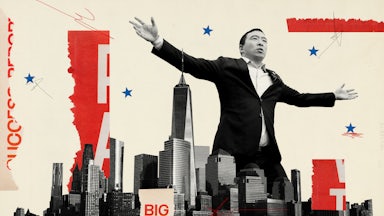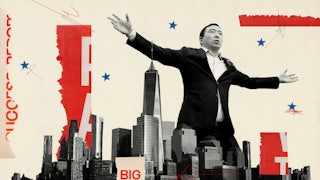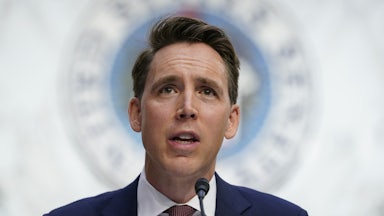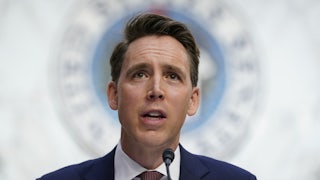When Josh Hawley was asked, during a Washington Post event promoting his new book, about his involvement in the January 6 attempted coup at the Capitol, the senator got huffy. “Don’t try to censor, cancel, and silence me here,” Hawley said.
“Senator,” Post reporter Cat Zakrzewski replied, “we’re hosting you here.”
It was a clever retort—an homage to Ronald Reagan’s famous “I am paying for this microphone, Mr. Green!”—that undermined Hawley’s oft-repeated claim that he has been deplatformed as a victim of cancel culture. But it also pointed to a larger issue: Hawley played a role in cheerleading that coup, and yet the Post was hosting him anyway.
Four months after the Capitol riot, it’s clear that many in the press still don’t know how to cover those who supported Donald Trump’s “Big Lie” about election fraud. And while news organizations dither, the Big Lie continues to spread. January 6 may be a distant memory for many at this point, but lies about a “stolen election” are the bond holding the Republican Party together.
Zakrzewski’s interview with Hawley showed the deficiencies of one media approach. Facing criticism for hosting the senator, Zakrzewski, a tech reporter, devoted the first half of her interview to the senator’s role in the insurrection, in which he led the effort to decertify Joe Biden’s legitimate victory and pumped his fist in support of the mob shortly before it stormed the Capitol. But Hawley hemmed and hawed in predictable ways—citing “election integrity,” unrelated comparisons to Black Lives Matter protests, and bogus constitutional arguments as justification for an attempted coup. To her credit, Zakrzewski did try to push back, but Hawley deflected those efforts, and the result was muddled. After 15 minutes, Zakrzewski moved on to the book, as if nothing had happened.
As NYU professor Jay Rosen noted on Twitter, this has become a common tactic for Republicans like Hawley. When pressed about their involvement in the insurrection, they “turn on” a “fog machine, lose most of the audience in hand-to-hand combat over important but arcane details, and run out the clock when the push back comes.”
This approach is still better than one favored by most journalists. Within weeks of the Capitol riot, many who voted to overturn the election were welcomed back to television. In April, Meet the Press hosted Mississippi Senator Roger Wicker, and Chuck Todd asked zero questions about the Big Lie that Wicker had helped perpetuate. Of the five Sunday shows, only CNN’s State of the Union has declined to invite a Republican who has lied about the 2020 election.
The decision to continue treating the proponents of the Big Lie as respectable politicians is based on two factors. The first is that these figures—Kevin McCarthy, Ron Johnson, Ted Cruz, Hawley—occupy key leadership positions in Congress, and, in some cases, are viewed as probable 2024 candidates. A blanket ban would effectively shut out the most prominent Republicans in the country because all of these people have spent the last six months lying continuously about the 2020 election. The second is that the January 6 riot was four months ago, we have a new president now, and the country has presumably moved on. Dwelling on the riot would mean neglecting things that are happening now—debates over infrastructure, paid family leave, Joe Biden’s foreign policy.
The problem is that Republicans are still obsessing over the 2020 result. In Arizona, they are authorizing absurd forensic election audits. The new social media “platform” (it’s a blog, and a bad one at that) that Trump launched on Tuesday is devoted almost entirely to spreading misinformation about the election. Liz Cheney is being purged from House GOP leadership for acknowledging that Biden won fair and square. Mitt Romney, the party’s 2012 presidential candidate, is being heckled and berated wherever he goes for criticizing Donald Trump, while primary challenges are being mounted against nearly every Republican who failed to march in lockstep behind Trump’s election lies.
As my colleague Matt Ford wrote on Tuesday, “the GOP’s vision for American life is that Democrats stole the 2020 election from Donald Trump. The party’s central idea for national governance is that Donald Trump should be in charge of it. And its policy agenda is, well, doing things that could make it easier for Trump to win in 2024.”
This is the message the party will deliver in the 2022 midterms. It’s incredible that the mainstream press still isn’t prepared to handle it, especially given its dismal failure to adequately address the aftermath of the January 6 riot. Historically, the press has covered these pushes to take back Congress as a grand narrative. In 2006, Democrats retook the House based on frustration with the Iraq War. In 2010, the GOP won it by capitalizing on anger about spending and health care. In 2018, the Democrats turned disgust with Donald Trump’s corruption into a “blue wave.” But for the GOP in 2021, there is no reality-based issue. The only thing that Republicans care about is the idea that Democrats stole the White House from Donald Trump.
Covering this adequately will require dexterity that many in the press rarely show. There is no point inviting a Republican onto a program to lie about the election, even if the interviewer pushes back. This approach simply hasn’t worked—as Hawley’s interview with the Post showed, Republicans know they can rope-a-dope their interlocutor, who will eventually have to move on to something else. At the same time, not enough attention is being paid to the centrality of the Big Lie in Republican politics at the moment. With the exception of the furious attempts to supplant Cheney, the story remains something of a sideshow. Unfortunately, it’s the main event.








